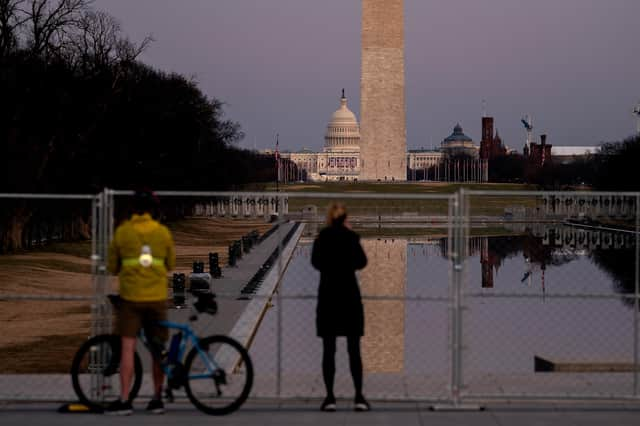Security fears cast long shadow over Joe Biden's inauguration


With just three days to go before Joe Biden is installed as the 46th president of the US, authorities are stepping up a security operation unparalleled in scale in peacetime history.
Amid fears of a potential second attack on the Capitol and widespread unrest around the country, plans which were first hatched a year ago are being hurriedly revised to counter the danger posed by amorphous far-right domestic extremist groups.
Advertisement
Hide AdAdvertisement
Hide AdCounter-terrorism experts said that the US resembled a “tinderbox,” and warned that “very serious attacks” could be aimed at soft targets in the weeks, months, and even years ahead.
Tim Bradley, a former FBI special agent who coordinated security and crisis response plans for Bill Clinton’s 1997 inauguration, said that in the wake of last week’s attack on the Capitol, he expected the planned security perimeter would have been “hardened,” but said it was impossible to protect the entirety of the federal district.
“There are still a lot of soft targets,” he told Scotland on Sunday. “Someone could go into a hotel and start disturbance, and following the riots, they found pipe bombs outside the Republican National Committee and the Democratic National Committee.”
It is into this febrile atmosphere that Mr Biden will seek to inject calm and order. The theme for his inauguration is ‘America United’, a reflection on the “beginning of a new national journey that restores the soul of America.”
It is clear that there will be nothing like the vast crowds witnessed in 2009 or, for that matter, the considerably smaller crowds seen when Mr Trump took up office in 2017, particularly with the National Mall – the traditional gathering place for spectators – set to be closed.
Mr Biden and David Kessler, the inauguration’s chief medical adviser, have appealed to members of the public to mark the inaugural events at home in order to protect themselves and their families.
People coming to Washington DC are required to obtain a negative Covid-19 test, with visitors from some parts of the US subject to a 14 day quarantine, and while traditionally, members of Congress distribute 200,000 tickets to constituents, this year each elected representative may attend with just a single guest.
The vast majority of traditional parades, galas, and balls, meanwhile, will be staged online, or postponed altogether. According to James Clyburn, the chair of Mr Biden’s inaugural committee, there is a growing appetite to shelve celebrations of the inauguration until 4 July, when it is hoped the coronavirus vaccine rollout will allow restrictions to be eased.
Advertisement
Hide AdAdvertisement
Hide AdOther conventions are being upended by choice, rather than necessity. In a final, petty show of defiance for norms and customs, Mr Trump has made it clear he will be the first incumbent of the White House to skip his successor’s swearing in ceremony in 152 years.
But the prospect of much smaller crowds does not negate the clear and present danger at hand - at least 16 protest groups allied with Mr Trump have registered for permits which would allow them to gather in the vicinity of the White House - nor does it ease the burden placed on Mr Biden of redeeming America’s soul.
If it is not quite condemned to everlasting damnation, it is doubtless in a state of purgatory, with FBI intelligence suggesting armed extremists are planning to descend not just on Washington DC, but every state capital.
The National Guard has been told to prepare for the potential use of improvised explosive devices by hostile actors, while a rehearsal for the inauguration, planned for today, has been postponed amid security concerns.
According to the New York Times, a US Defence Department official said those worst-case scenarios include aircraft attacks and the use of remote drones to inflict death and injury on those in attendance.
The response to these multifaceted threats was starkly illustrated by Seth Moulton, a former Marine turned Democratic congressman, who pointed out there are currently more US troops in Washington DC than Afghanistan.
Indeed, the Secret Service is overseeing a colossal operation which will utilise as many as 20,000 armed National Guard troops and thousands of police and tactical officers, with an upscaling in security measures beginning six days earlier than planned.
Miles of steel perimeter fencing will be expanded further out from the Capitol and the White House than in previous inaugurations. In the meantime, intelligence officers are attempting to trace plans by extremists, who are increasingly turning to encrypted messaging apps, such as Telegram. In the days after the Capitol siege, some of the messages shared included an Army field manual and exhortations to "shoot politicians," and "encourage armed struggle.”
Advertisement
Hide AdAdvertisement
Hide AdYet the way insurrectionists were able to infiltrate the seat of US democracy with such ease is a cause for concern. Security expert Chris Hagon, who served as the personal protection officer to both the Queen and Prince Philip during 11 years’ service with Scotland Yard’s Royalty and Diplomatic Protection Command, said the lack of security preparedness ahead of that attack was “astounding.”
“There appears to be emerging evidence that there may have been collusion or inside connivance,” he said. “Why were the authorities so unprepared, even though federal agencies and social media activity clearly portending a violent outcome? Were these failures deliberate, because of incompetence or disbelief?”
Chris Phillips, former head of the UK’s National Counter Terrorism Security Office, warned that the pressure facing authorities would persist long past the inauguration.
“There are so many disenfranchised people with access to firearms, any one of which could turn bad,” he said. “It wouldn’t surprise me if there were some major incidents, but also it’s mad enough for militias to carry out very serious attacks aimed at more easy targets.”